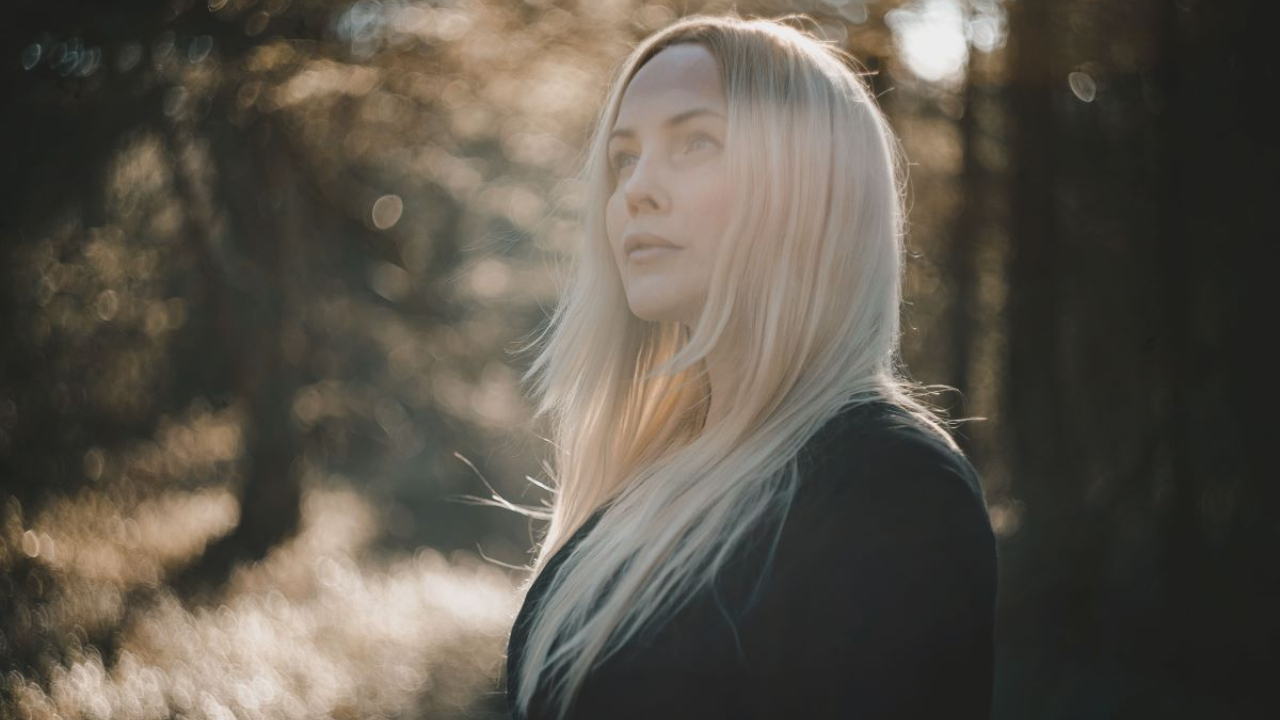
Like the great roots of an ancient tree, Kati Rán’s musical world is vast. Over the nine years it took to create, the Dutch Nordic folk artist’s second album SÁLA saw her travel overseas to source rare historical instruments, spend hundreds of hours learning ancient languages and converse with academics to uncover an even deeper understanding of what inspires her most - Norse mythology. “It’s been a long time in the making,” she admits with a wry chuckle.
SÁLA (Old Norse for ‘soul’ and ‘sea’) is a rich tapestry of cinematic, oceanic soundscapes and multilingual folk melodies derived from poetry, ancient texts and spellcraft, flanked by Rán’s playing of numerous historical instruments. The gorgeously meditative Stone Pillars features the use of a lava stone marimba, a percussive instrument similar to a xylophone, which was obtained from a stonemason in Iceland.
“It took a few years to find him, and then I had to travel to the Icelandic countryside and have a translator with me”, she explains. “We recorded in a barn in the middle of nowhere and it gave us that connection to the land, because the instrument is literally made of slates of stone from the ground”.
Doubling as a sonic travelogue, the album was also recorded in Finland, Norway and Rán’s home country of the Netherlands; the diverse landscapes echoing through the natural elements and languages of each song. “In Finland, it was like recharging the battery between doing a whole day of vocal takes to be able to have a walk in the woods just outside of the house”, Kati says, speaking of how the scenery inspired her.
“Same for Iceland, which is like being on a different planet, because you’re forced to be more careful there as it can also be dangerous - you could step into a glacier or be evacuated due to erupting volcanoes”.
On top of its many creative demands, SÁLA became an intense act of self-therapy, following setbacks of illness, depression and heartbreak. “I found it very cathartic,” she agrees. “Going through the themes that I have on the album, which are all these different emotional states that I have intertwined with several states in nature.”
Since Rán’s first release LYS in 2015 with her former band L.E.A.F, her defining mantra has always been about creating music that has the power to connect people back to the Earth. “Nature is tied in with working with historic sources as well as the old instruments that are actually made from wood and the bones of animals” she notes. “Nature is a teacher. It's so important to be mindful of the fact that we are a part of it and not on top of it.”
Describing the art of being in touch with nature as a “lost craft”, rediscovering things that are forgotten or hidden manifests itself in multiple ways in Rán’s work. SÁLA reimagines the obscure Nordic myth of the nine billow maidens, the children of the goddess Rán (which partly inspired her stage-name, her birth name Kaat Geevers) and the jötunn [giant] Ægir. Each track is titled after the daughters, shining a light on their unexplored legend as well as the stories of other overshadowed women across history.
“I had to really embody the feminine point of view instead of merely portraying it,” she says. “The process was super intense, comparable to method acting.”
Despite being from the Netherlands, Rán has always gravitated towards the Nordic regions. “The last name of Rán actually runs in my family,” she reveals. “It comes from my great grandmother’s side, so early on I started to be interested in Nordic folklore and Scandinavian fairy tales.”
Her defining baptism into the culture however took place in 2010, when she visited Norway for the first Viking metal festival. “I felt right at home. I felt a soul connection, and it actually really shaped the course of my life and future travels.”
Since then, Rán has been fully immersed in the Nordic folk scene, first working as a roadie in her twenties for the neo Celtic pagan folk band Omnia, before going on to work as a solo artist on soundtracks for Netflix series Vikings: Valhalla and the video games Assassin’s Creed: Valhalla.
“I first started learning the most difficult instrument, the nyckelharpa”, she says. “But actually, my favourite instrument is my voice, as it’s connected to your soul and to your breath. Being able to express yourself in a musical way with your voice is so vital, as it really gives that emotional soul to the music and the ability to share your stories”.
While her official output has been limited considering her time in the Nordic folk scene, Rán’s impact has been significant, her songs wracking up millions of streams online. Most recently, she has collaborated with figures including Napalm Death's Mitch Harris, black metal vocalist Gaahl and members of Heilung, who all feature on SÁLA.
“I’ve had the crème de la crème guide me into this world and teach me things,” she says happily. “They’ve given me songwriting lessons, sorcery lessons… all kinds of lessons”.
While Rán is adamant that her work embodies the efforts of a community, her talent and painstakingly in-depth exploration into the magic of the North remains fully her own. “This has been a product of love and research, and I offer it to give art to the world to the best of my ability”, she proudly states.







